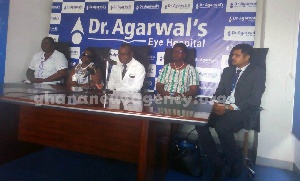 Prevalence rate of blindness in the country is at 0.74% representing 207,200
Prevalence rate of blindness in the country is at 0.74% representing 207,200
About 285 million people are visually impaired worldwide, with 39 million people blind and 246 million people having low vision severe or moderate visual impairment.
Out of these, about 90 per cent of the world’s visually impaired people live in developing countries, and globally, uncorrected refractive errors are the main cause of visual impairment.
But according to the Eye Care Unit of the Institutional Care Department of the Ghana Health Service (GHS), prevalence rate of blindness in the country is at 0.74 per cent, representing 207,200, while severe visual impairment is at 1.07, representing 299,600.
In Ghana, cataract is said to be the leading cause of blindness with 54.8 per cent while glaucoma follows with 19.4 per cent and diabetic retinopathy follows with 12.3 per cent.
The World Health Organisation’s (WHO) requires that one ophthalmologist to the patient's ratio should be to 250,000 patients.
This requirement as at August 2017, had not been met by Ghana as there were a human resource gap for eye care professionals,that needs to be corrected.
Ghana currently has 91 ophthalmologists, and would need 21 more to reach the WHO target.
To this effect Dr Agarwals Eye Hospital led by a team of highly-skilled ophthalmologists and committed to offering a high class eye care solutions with a personalised touch and also offers ground-breaking innovations that are sure to transform that vision.
The Hospital had performed the first ever “Keratoprosthesis” surgery in Ghana on a 39 year-old woman Rhoda Mensah who developed Steven Johnson Syndrome (SJS), a disease of ocular surface.
The Keratoprosthesis surgery is a procedure used to restore eyesight for many, who cannot benefit from cornea transplant.
The woman who was dependent on family members for her day to day activities developed the disease following her treatment of malaria which affected her vision.
Dr Asiwome Kwesi Seneadza, Medical Director of the Hospital said the surgery is a procedure where a disease cornea is replaced with a partial artificial cornea, “a disease which is not commonly done in many places.”
He said in line with the hospital’s vision to move quality eye care beyond the continents with its state-of-the art equipment, the hospital introduced surgery in Ghana.
He said the hospital was focused on giving the average Ghanaian the best eye care treatment to eradicate near blindness cases amongst Ghanaians in Ghana at a very affordable rates as part of its responsibility.
He said: “Looking at the high rate of eye problems facing the Ghanaian population with high percentage of being blindness, this new technology, being the first of its kind is going to improve and curb the problem of blindness and other eye related issues to make Ghana a blind free country.”
Dr Seneadza who is also a Consultant of Vitreo-Retinal Surgeon said “Keratoprosthesis” was reserved for patients with who traditional penetrating keratoplasty-PKP (other form of cornea surgery) cannot be done, especially the steven johnson syndrome, chemical injury and Ocular Cicatricial Pemphigoid (OCP).
He said after the surgery day one, the patient had her vision almost 95 per cent and went around the city of Accra looking at things that she could see during her lost of sight.
The Medical Director said, although traditional penetrating keratoplasty or corneal transplantation is an established treatment of some forms of corneal blindness, some conditions were not amenable to PKP.
He said those that were taken care of include graft failure, SJS, OCP, other autoimmune diseases, Ocular burns (acid and alkali) and other conditions with poor prognosis with traditional penetrating keratoplasty, adding, “Prostho Keratoplasty is the term for a procedure in which a damaged cornea is replaced with an artificial cornea.”
The services offered at the hospital include; Cataract surgery with premium lens implantation, vitreo Retinal surgeries including; macular hole surgeries, Glued IOL, Penetrating keratoplasty, keratoprosthesis, Deep Anterior lamellar Keratoplasty, phakic Intraocular Lens for refractive error, Corneal Collagen cross Linking for Keratoconus, Intravitreal Injections, Contact Lens, Low, vision Aid and Optics, Laboratory and a Pharmacy.